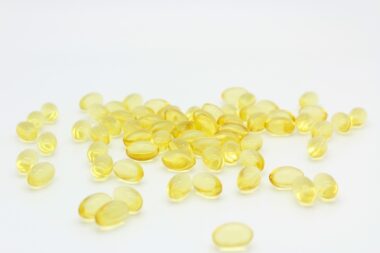Omega-3 Fatty Acids and Their Effect on Cardiovascular Health in Sport
Omega-3 fatty acids have captured the attention of health enthusiasts and athletes due to their potential cardiovascular benefits. These essential fats, primarily found in fatty fish like salmon and dietary supplements, play a crucial role in maintaining heart health and improving athletic performance. The two most significant types of omega-3s are EPA (eicosapentaenoic acid) and DHA (docosahexaenoic acid). Research indicates that these fatty acids can help reduce inflammation, lower triglyceride levels, and improve endothelial function, all vital for athletes needing optimal cardiovascular function. In essence, by incorporating omega-3 into their diets, individuals involved in sports can potentially enhance their exercise capacity. Omega-3s may also reduce the risk of heart diseases, making them an invaluable asset in a sportsperson’s nutritional arsenal. Furthermore, various studies underline the relationship between omega-3 intake and increased blood flow, which can facilitate better oxygen delivery to the muscles during exertion. As such, athletes should seriously consider the inclusion of omega-3 supplements or sources in their dietary regimen, ensuring a healthier heart while competing at elite levels.
Various health organizations recommend increasing omega-3 consumption to reap numerous cardiovascular benefits. A pivotal study found that regular intake of these fatty acids leads to a notable decrease in heart rhythm disorders, a condition that affects numerous athletes. Omega-3 fatty acids significantly decrease inflammation, leading to improved recovery times post-exercise. This recovery is critical for athletes engaged in high-intensity training routines or competitive events requiring resilience and stamina. Additionally, research shows that omega-3 supplementation can help mitigate exercise-induced oxidative stress, allowing athletes to recover faster without succumbing to chronic fatigue or muscle damage. Moreover, potential benefits extend beyond the physical realm, as noted in research showing how omega-3s may also bolster mood and cognitive function. Enhanced mental performance can translate into improved focus during competitions, providing a competitive edge. Achieving a balanced intake of omega-3s might involve exploring various food sources or considering fish oil supplements to meet dietary needs. Always consult with a healthcare professional before making significant dietary changes, particularly for competitive athletes aiming to achieve optimum health and performance levels.
Role of Omega-3 in Reducing Inflammation
One of the key advantages of omega-3 fatty acids is their potent anti-inflammatory properties. For athletes, maintaining a healthy inflammation response is crucial for both performance and recovery. Prolonged or excessive inflammation can result in delayed recovery and overuse injuries, two factors that can significantly derail training goals. Regular intake of omega-3 can help to modulate the body’s inflammatory response post-exercise, ideally leading to enhanced recovery outcomes and minimized muscle soreness. Studies have shown that athletes supplementing with omega-3 experience decreased levels of pro-inflammatory cytokines after engaging in strenuous activities. This outcome highlights the ability of omega-3s to counteract inflammation naturally, promoting a quicker return to training activities. Nor should we overlook the potential that omega-3 fatty acids boast in protecting cardiovascular health through similar mechanisms. By regulating inflammatory markers, these fatty acids minimize cardiovascular stress, invaluable for athletes thereby ensuring they maintain peak physical condition throughout their competitive seasons. Therefore, utilizing omega-3 supplementation may serve as a strategic choice for athletes seeking to optimize their training regimens and competitive performances.
Furthermore, omega-3 fatty acids play a vital role in improving heart rate variability (HRV), a significant marker of cardiovascular health and fitness. For athletes, a higher HRV correlates to better autonomic regulation and a more effective response to training stressors. Studies suggest that a diet rich in omega-3 can positively influence HRV, promoting a more robust cardiovascular system capable of withstanding the rigors inherent in sports. Improved HRV can lead to better recovery outcomes and aid in preventing overtraining – a common problem many athletes face. Regular assessment of HRV can provide valuable insights into an athlete’s readiness to train and compete, making it an important factor in their overall performance strategy. Therefore, monitoring omega-3 intake should be considered a priority, as adequate levels can significantly contribute to maintaining optimal heart function. This can ultimately enhance overall athletic performance. Pairing dietary modifications with consistent training can harmoniously drive athletic success in the long term. Thus, omega-3 fatty acids are a prudent addition to the nutritional strategies of those deeply entrenched in rigorous sporting pursuits.
Potential Cardiovascular Risks of Insufficient Omega-3
A lack of omega-3 fatty acids can lead to potential cardiovascular health risks, which many athletes might overlook. Certain studies indicate that insufficient levels of omega-3 can elevate the risk of heart diseases, hypertension, and even heart attacks. Given the intensity and demands of athletic training, athletes are often predisposed to stress not just on their muscles but also their heart. Underestimating omega-3’s importance can undermine long-term cardiovascular wellness. Notably, omega-3 fatty acids support optimal triglyceride levels; when deficient, athletes may face challenges regarding lipid profiles that detract from their overall health journey. It is reported that many athletes do not consume adequate omega-3 through dietary sources alone, raising the need for effective supplementation strategies. Including omega-3 supplements in a robust diet can counterbalance these risks, facilitating improved overall heart health while keeping energy levels consistent, which is critical for athletes engaged in intense training. Thus, it’s crucial for athletes to prioritize the inclusion of omega-3s in their diet, effectively bridging nutritional gaps that may affect their cardiovascular health.
In addition to cardiovascular benefits, omega-3 fatty acids offer several other health improvements relevant to athletes. One noteworthy prospective benefit is their ability to enhance mental clarity and mood, crucial during competitive events requiring peak cognitive performance. Multiple studies have indicated that omega-3 supplementation boosts serotonin levels, which may counteract anxiety and improve overall mood. Consequently, athletes could experience enhanced decision-making abilities, optimal concentration, and reduced pre-competition nerves, ultimately translating into better performance outcomes. Additionally, omega-3 fatty acids promote joint health due to their anti-inflammatory properties. For athletes, joint health translates into longevity in their sports careers and enhanced performance by maintaining mobility and flexibility. Given the rigorous strains athletes place on their bodies, the incorporation of omega-3s can be an effective measure to maintain joint integrity throughout countless games and workouts. Therefore, it’s vital for athletes to consider omega-3-rich foods or effective supplements as a cornerstone in their dietary practices, ensuring they receive comprehensive benefits from every aspect of their nutritional intake.
How to Incorporate Omega-3s into Your Diet
Incorporating omega-3 fatty acids into an athlete’s diet can be both simple and enjoyable. Numerous dietary sources are rich in omega-3, including fatty fish, flaxseeds, chia seeds, and walnuts. For individuals who might not enjoy fish or have dietary restrictions, exploring vegetarian options like flaxseed oil or algae-based supplements can provide excellent alternatives. For individuals aiming for optimal intake, it is recommended to consume 1 to 2 servings of fatty fish weekly to meet the necessary omega-3 levels beneficial for cardiovascular health. Public health guidelines consistently emphasize the importance of omega-3s, reinforcing their role not only in boosting physical health but also in enhancing cognitive function and mood. Additionally, athletes can enhance meals with omega-3-rich ingredients such as adding chia seeds to smoothies or flaxseed oil to salad dressings. Understanding the importance of omega-3s in enhancing performance, mental clarity, and overall health should encourage athletes to commit to dietary modifications. Keeping dietary choices varied, nutritious, and enjoyable helps athletes maintain their focus and performance while enhancing their quality of life.
Ultimately, engaging with a healthcare provider or a sports nutritionist to tailor specific dietary needs can prove beneficial for athletes aiming to optimize their nutrition for sport. Regular discussions about diet can help clarify how best to integrate omega-3s into personalized meal plans and supplementation regimes. Athletes are often busy, which emphasizes the need for convenient, easy-to-implement nutrition solutions without sacrificing health standards. Understanding the implications of omega-3 consumption for heart health may also deepen athletes’ motivation to prioritize their intake. Among many athletes, knowledge of the impact of heart health on performance levels serves as a compelling reason to include omega-3s regularly. As more research emerges highlighting the significance of these fatty acids in boosting overall fitness levels, their integration becomes imperative for serious athletes. For anyone involved in sports, making a conscious effort to consume adequate omega-3s can fortify their body against the demands of competitive sports and contribute to long-term health benefits. By seamlessly blending omega-3s into their diet, athletes can enhance not just their performance but their overall well-being.





